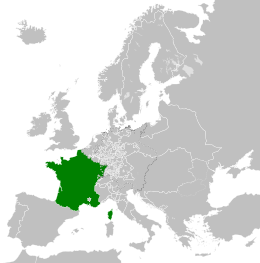More languages
More actions
| Kingdom of France Royaume de France | |
|---|---|
| 987–1792 | |
 France in 1789 | |
| Capital | Paris |
| Dominant mode of production | Feudalism |
| Government | Monarchy |
The Kingdom of France was a state in Western Europe during the medieval and early modern periods. It was weaker than Spain but had a more economic development in some areas and surpassed Spain after the Thirty Years' War, becoming the leading power in Europe.[1]
History[edit | edit source]
Rebellion[edit | edit source]
Peasants revolted across northern France in 1358, and 3,000 urban artisans led by Etienne Marcel marched to the royal palace and forced the monarch's heir to support the rebellion.[2]
Centralization and decline of feudalism[edit | edit source]
Louis Valois, who reigned from 1461 to 1483, expanded the borders of France to the Alps, Pyrenees, and Jura mountains and protected commerce and industry.[3]
King Charles Valois unified France and Brittany in 1491 by marrying Anne, the heiress of the Duchy of Brittany. Between 1494 and 1559, France fought against the Holy Roman Empire and Hapsburg-ruled Spain in northern Italy. During the 16th century, the French monarchy subordinated the Church and Parliament to the crown and forbid nobles from organizing their own military forces.[2]
Protestant Reformation[edit | edit source]
The Protestant Reformation spread through about a third of France. Most of its supporters were the early bourgeoisie, but some nobles also converted and became Huguenots. Aristocratic factions fought in religious wars, which sometimes took the form of pogroms against Protestants such as the St. Bartholomew's Day Massacre of 1572. In 1589, the Protestant Henry of Navarre became King and reunited the country by converting to Catholicism but giving religious freedom to Protestants.
During the 1620s and 1630s, the state continued to centralize under Cardinal Richelieu. The Huguenots and feudal nobles lost power, while the monarchy appointed royal administrators to rule in their place. France fought in the Thirty Years' War from 1635 to 1648 and helped defeat the Hapsburgs, making France the leading power in Europe. Persecution of Protestants returned in 1685 when the Edict of Nantes was revoked, and France backed three Catholic rebellions in England following the Glorious Revolution.[1]
Seven Years' War[edit | edit source]
France lost its colonial empire in America and India to the British in 1763 as a result of the Seven Years' War.[4]
Collapse[edit | edit source]
See main article: French Revolution
References[edit | edit source]
- ↑ 1.0 1.1 Neil Faulkner (2013). A Marxist History of the World: From Neanderthals to Neoliberals: 'The First Wave of Bourgeois Revolutions' (pp. 95–104, 115). [PDF] Pluto Press. ISBN 9781849648639 [LG]
- ↑ 2.0 2.1 Neil Faulkner (2013). A Marxist History of the World: From Neanderthals to Neoliberals: 'European Feudalism' (pp. 86–88). [PDF] Pluto Press. ISBN 9781849648639 [LG]
- ↑ Friedrich Engels (1850). The Peasant War in Germany: 'Notes'. [MIA]
- ↑ Neil Faulkner (2013). A Marxist History of the World: From Neanderthals to Neoliberals: 'The Second Wave of Bourgeois Revolutions' (p. 119). [PDF] Pluto Press. ISBN 9781849648639 [LG]


